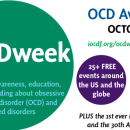ERP Tip of the Day #1
Starting today, I am going to start posting random ERP tips as they occur to me, as there are certain roadblocks that many of my OCD patients tend to encounter. If it’s helpful for my patients, maybe it’s helpful for you. If you’re interested in more ERP tips, click the following link for all the posts in this series. Exposure and Response Prevention (ERP) Tips for OCD These posts will probably be a bit shorter unless the concept requires a more thorough discussion. Please feel free to leave comments below, if you need more information. Today’s tip is… ERP Tip #1 Do not label your rituals as ERP. Instead embrace openness, defenselessness, and vulnerability. You might think that you never do this, but it happens more often than you think. Some people that I know will encounter triggers for...
Read MoreImaginal Exposure vs. In Vivo Exposure for OCD
As I’ve talked about in numerous posts, overcoming OCD involves learning to co-exist with doubt and uncertainty. This idea can be a bit counter-intuitive at first, as many people initially expect OCD treatment to reduce uncertainty. One therapeutic approach that helps with this process is exposure and response prevention (ERP) for OCD. Not surprisingly, ERP consists of two parts: 1) exposure, and 2) response prevention. An exposure is when you do something on purpose to provoke an anxiety spike. By definition, exposures are not accidental; rather, they are pre-planned, deliberate offensive strikes against your OCD. Exposures are designed to help you build up your tolerance to fear-producing situations. Exposures are often completed according to an exposure hierarchy, meaning that people typically complete lower level exposures (i.e., less distressing exposures) before gradually working up to higher level ones. Response prevention...
Read MoreOCD Awareness Week 2016
It’s #OCDWEEK! Help raise awareness and understanding about obsessive compulsive disorder (OCD) and related disorders. Welcome to #OCDWEEK 2016, a week organized by IOCDF to help raise awareness about OCD and related conditions! If you visit IOCDF’s website, you’ll find information about local and online programs and events designed to help increase the general public’s understanding of OCD. When I started this blog a few years ago, the internet was awash in misinformation about the nature of OCD. OCD was (more often than not) described in oversimplified terms, and the popular media largely mischaracterized OCD as a disorder defined primarily on the basis of excessive washing or checking behaviors. If you didn’t fit this mold, it was implied that you didn’t have OCD. I was hoping that, through my writing, I might be able to address some of these...
Read MoreGroup Therapy for OCD: Power in Numbers
Group Therapy for OCD Wow. Our first OCD treatment group met yesterday, and IMHO, it was an incredible experience. Thank you to all who attended and showed such courage in standing up to their OCD. I was reminded anew how group therapy for OCD is so different than individual therapy. OCD wants to separate us from others, to shame us, to make us feel hopeless, defective, and guilty… It wants us to define ourselves on the basis of things we can’t control and forget that we are not our thoughts. After all, that’s how it maintains its power over us. Although there is great vulnerability in putting your thoughts out there and saying them aloud in front of others, by doing so, we defy our OCD. OCD lost a few battles yesterday. Let’s keep this war going. For those...
Read MorePostpartum OCD – Fear of Harming Your Baby
Parents brace themselves for many changes when a new baby comes home. As new routines replace old, life quickly becomes a confusing jumble of cherished memories, bottles, and dirty diapers. Parenting can be joyful, but it can also be terrifying. Parenting comes with many important responsibilities, and it can be intimidating–if not downright frightening–to be responsible for protecting and caring for a vulnerable new life. What is Postpartum OCD (ppOCD)? For some parents (mothers and fathers alike), new parenthood may spark postpartum obsessive-compulsive disorder (OCD), a surprisingly common anxiety disorder that is associated with violent and disturbing thoughts, images, or urges (Fairbrother & Abramowitz, 2007). Symptoms may begin suddenly after the new baby arrives home, or pre-existing OCD symptoms may be exacerbated by new parental responsibilities. Postpartum OCD symptoms can involve virtually any type of OCD symptom, but harm obsessions...
Read More







